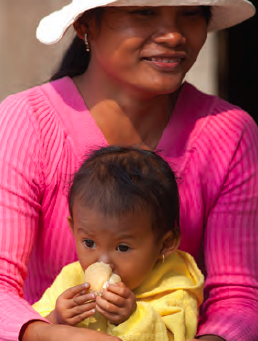Sustainable Development Goal 2: End hunger, achieve food security and improved nutrition, and promote sustainable agriculture
 Agreed by all UN member states, Transforming Our World: 2030 Agenda for Sustainable Development, consists of a Declaration, 17 Global Goals and 169 targets, a section on means of implementation and renewed global partnership, and a framework for review and follow-up.
Agreed by all UN member states, Transforming Our World: 2030 Agenda for Sustainable Development, consists of a Declaration, 17 Global Goals and 169 targets, a section on means of implementation and renewed global partnership, and a framework for review and follow-up.
Within the 2030 Agenda, the UN member states have committed to comprehensive, integrated and universal transformations which include ending hunger and malnutrition once and for all by 2030. This ambition is captured in Global Goal 2, which includes achievement of food security, improved nutrition and sustainable agriculture as part of a comprehensive set of actions.
The following targets are associated with the goal:
2.1 By 2030 end hunger and ensure access by all people, in particular the poor and people in vulnerable situations including infants, to safe, nutritious and sufficient food all year round.
2.2 By 2030 end all forms of malnutrition, including achieving by 2025 the internationally agreed targets on stunting and wasting in children under five years of age, and address the nutritional needs of adolescent girls, pregnant and lactating women, and older persons.
2.3 By 2030 double the agricultural productivity and the incomes of small-scale food producers, particularly women, indigenous peoples, family farmers, pastoralists and fishers, including through secure and equal access to land, other productive resources and inputs, knowledge, financial services, markets, and opportunities for value addition and non-farm employment.
2.4 By 2030 ensure sustainable food production systems and implement resilient agricultural practices that increase productivity and production, that help maintain ecosystems, that strengthen capacity for adaptation to climate change, extreme weather, drought, flooding and other disasters, and that progressively improve land and soil quality.
2.5 By 2030 maintain genetic diversity of seeds, cultivated plants, farmed and domesticated animals and their related wild species, including through soundly managed and diversified seed and plant banks at national, regional and international levels, and ensure access to and fair and equitable sharing of benefits arising from the utilization of genetic resources and associated traditional knowledge as internationally agreed.
2.6 Increase investment, including through enhanced international cooperation, in rural infrastructure, agricultural research and extension services, technology development, and plant and livestock gene banks to enhance agricultural productive capacity in developing countries, in particular in least developed countries.
2.7 Correct and prevent trade restrictions and distortions in world agricultural markets including by the parallel elimination of all forms of agricultural export subsidies and all export measures with equivalent effect, in accordance with the mandate of the Doha Development Round.
2.8 Adopt measures to ensure the proper functioning of food commodity markets and their derivatives, and facilitate timely access to market information, including on food reserves, in order to help limit extreme food price volatility.
Dr. David Nabarro, who previously coordinated the SUN Movement, has been appointed Special Adviser on the 2030 Agenda for Sustainable Development to work with member states and other relevant stakeholders to galvanise action on implementation of the Agenda. He will bring his considerable knowledge of the SUN Movement to the nutrition-related SDGs. At least 12 of the 17 Global Goals contain indicators that are highly relevant for nutrition, reflecting the centrality of nutrition for instigating comprehensive change.
Improved nutrition is the platform for progress in health, education, employment, female empowerment, poverty reduction and the mitigation of greenhouse gas emissions. In turn, water, sanitation and hygiene, education, food systems, climate change, social protection and agriculture all have an important impact on nutrition outcomes.
While the ambition of the nutrition community is grounded in Goal 2, a nutrition revolution is needed to ensure the full potential of all goals across the 2030 Agenda to bring lasting benefits to everyone, everywhere.
To find out more click here
We thank Florence Lesbannes of the SUN Movement Secretariat for help in writing this piece.

